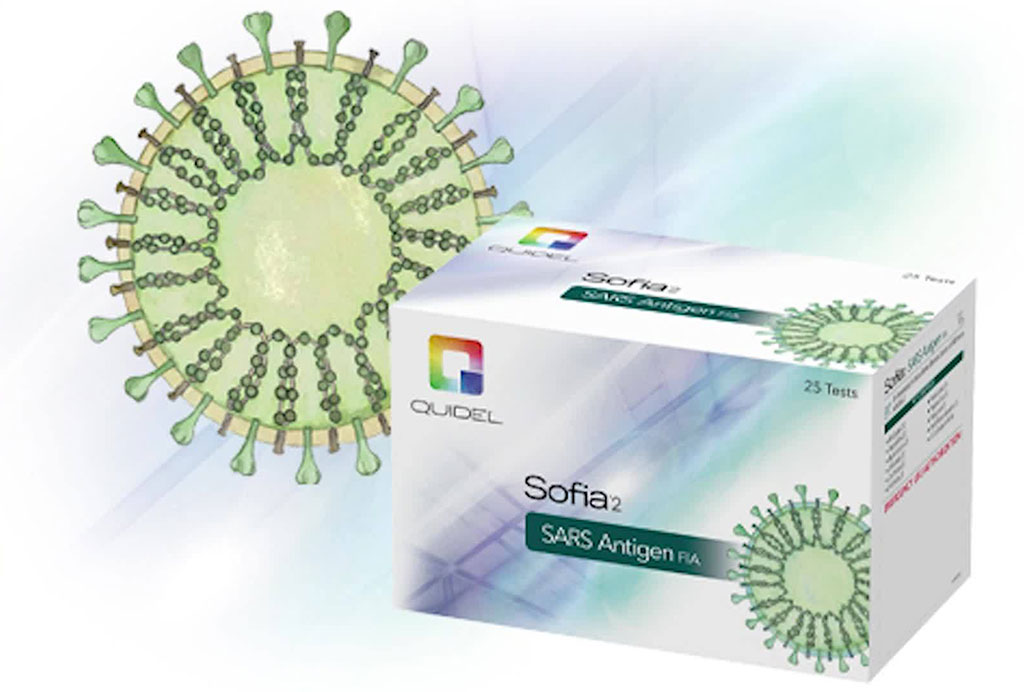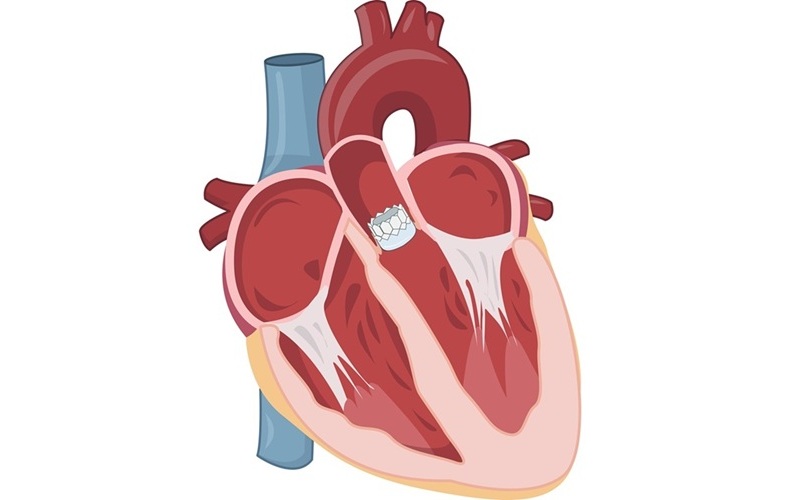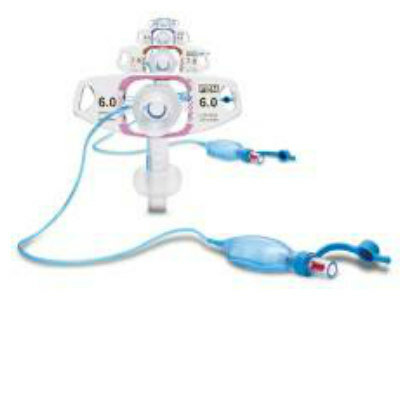Quidel’s Sofia 2 SARS Antigen FIA Becomes First COVID-19 Antigen Test to Secure FDA Emergency Use Authorization
|
By HospiMedica International staff writers Posted on 11 May 2020 |

Image: Quidel Corporation’s Sofia 2 SARS Antigen FIA (Photo courtesy of Quidel Corporation)
Quidel Corporation’s (San Diego, CA, USA) Sofia 2 SARS Antigen FIA has become the first COVID-19 antigen test to be granted Emergency Use Authorization (EUA) by the US Food and Drug Administration (FDA).
The Sofia 2 SARS Antigen FIA is a rapid point-of-care test to be used with the Sofia 2 Fluorescent Immunoassay Analyzer for the rapid detection of SARS-CoV-2 in nasal or nasopharyngeal specimens from patients meeting the Centers for Disease Control and Prevention’s (CDC) criteria for suspected COVID-19 infection. The assay is currently available for sale in the United States under EUA, and Quidel is now shipping the product to its customer
Sofia 2, Quidel’s next-generation version of its Sofia instrumented system, utilizes the original Sofia fluorescent chemistry design while improving upon the graphical user interface and optics system to provide an accurate, objective and automated result in 15 minutes. The next-generation Sofia 2 system also comes connected to Virena, Quidel’s data management system, which provides aggregated, de-identified testing data in near real-time.
The Sofia 2 instrument also offers two distinct workflows: depending upon the user’s choice, the Sofia 2 SARS Antigen FIA cartridge is placed inside Sofia 2 for automatically timed development (WALK AWAY Mode); or test cartridges can be placed on the counter or bench top for a manually timed development and then placed into Sofia 2 to be scanned (READ NOW Mode), allowing the user to markedly increase testing throughput per hour.
“In the fight against COVID-19, our employees are truly making a difference, and I am tremendously proud of our organization’s ability to quickly develop and mobilize an accurate rapid antigen test,” said Douglas Bryant, president and chief executive officer of Quidel Corporation. “The EUA for our Sofia 2 SARS Antigen FIA allows us to arm our healthcare workers and first responders with a frontline solution for COVID-19 diagnosis, accelerating the time to diagnosis and potential treatment of COVID-19 for the patient.”
Related Links:
Quidel Corporation
The Sofia 2 SARS Antigen FIA is a rapid point-of-care test to be used with the Sofia 2 Fluorescent Immunoassay Analyzer for the rapid detection of SARS-CoV-2 in nasal or nasopharyngeal specimens from patients meeting the Centers for Disease Control and Prevention’s (CDC) criteria for suspected COVID-19 infection. The assay is currently available for sale in the United States under EUA, and Quidel is now shipping the product to its customer
Sofia 2, Quidel’s next-generation version of its Sofia instrumented system, utilizes the original Sofia fluorescent chemistry design while improving upon the graphical user interface and optics system to provide an accurate, objective and automated result in 15 minutes. The next-generation Sofia 2 system also comes connected to Virena, Quidel’s data management system, which provides aggregated, de-identified testing data in near real-time.
The Sofia 2 instrument also offers two distinct workflows: depending upon the user’s choice, the Sofia 2 SARS Antigen FIA cartridge is placed inside Sofia 2 for automatically timed development (WALK AWAY Mode); or test cartridges can be placed on the counter or bench top for a manually timed development and then placed into Sofia 2 to be scanned (READ NOW Mode), allowing the user to markedly increase testing throughput per hour.
“In the fight against COVID-19, our employees are truly making a difference, and I am tremendously proud of our organization’s ability to quickly develop and mobilize an accurate rapid antigen test,” said Douglas Bryant, president and chief executive officer of Quidel Corporation. “The EUA for our Sofia 2 SARS Antigen FIA allows us to arm our healthcare workers and first responders with a frontline solution for COVID-19 diagnosis, accelerating the time to diagnosis and potential treatment of COVID-19 for the patient.”
Related Links:
Quidel Corporation
Latest COVID-19 News
- Low-Cost System Detects SARS-CoV-2 Virus in Hospital Air Using High-Tech Bubbles
- World's First Inhalable COVID-19 Vaccine Approved in China
- COVID-19 Vaccine Patch Fights SARS-CoV-2 Variants Better than Needles
- Blood Viscosity Testing Can Predict Risk of Death in Hospitalized COVID-19 Patients
- ‘Covid Computer’ Uses AI to Detect COVID-19 from Chest CT Scans
- MRI Lung-Imaging Technique Shows Cause of Long-COVID Symptoms
- Chest CT Scans of COVID-19 Patients Could Help Distinguish Between SARS-CoV-2 Variants
- Specialized MRI Detects Lung Abnormalities in Non-Hospitalized Long COVID Patients
- AI Algorithm Identifies Hospitalized Patients at Highest Risk of Dying From COVID-19
- Sweat Sensor Detects Key Biomarkers That Provide Early Warning of COVID-19 and Flu
- Study Assesses Impact of COVID-19 on Ventilation/Perfusion Scintigraphy
- CT Imaging Study Finds Vaccination Reduces Risk of COVID-19 Associated Pulmonary Embolism
- Third Day in Hospital a ‘Tipping Point’ in Severity of COVID-19 Pneumonia
- Longer Interval Between COVID-19 Vaccines Generates Up to Nine Times as Many Antibodies
- AI Model for Monitoring COVID-19 Predicts Mortality Within First 30 Days of Admission
- AI Predicts COVID Prognosis at Near-Expert Level Based Off CT Scans
Channels
Critical Care
view channel
Mechanosensing-Based Approach Offers Promising Strategy to Treat Cardiovascular Fibrosis
Cardiac fibrosis, which involves the stiffening and scarring of heart tissue, is a fundamental feature of nearly every type of heart disease, from acute ischemic injuries to genetic cardiomyopathies.... Read more
AI Interpretability Tool for Photographed ECG Images Offers Pixel-Level Precision
The electrocardiogram (ECG) is a crucial diagnostic tool in modern medicine, used to detect heart conditions such as arrhythmias and structural abnormalities. Every year, millions of ECGs are performed... Read moreSurgical Techniques
view channel
Bioprinted Aortas Offer New Hope for Vascular Repair
Current treatment options for severe cardiovascular diseases include using grafts made from a patient's own tissue (autologous) or synthetic materials. However, autologous grafts require invasive surgery... Read more
Early TAVR Intervention Reduces Cardiovascular Events in Asymptomatic Aortic Stenosis Patients
Each year, approximately 300,000 Americans are diagnosed with aortic stenosis (AS), a serious condition that results from the narrowing or blockage of the aortic valve in the heart. Two common treatments... Read more
New Procedure Found Safe and Effective for Patients Undergoing Transcatheter Mitral Valve Replacement
In the United States, approximately four million people suffer from mitral valve regurgitation, the most common type of heart valve disease. As an alternative to open-heart surgery, transcatheter mitral... Read morePatient Care
view channel
Portable Biosensor Platform to Reduce Hospital-Acquired Infections
Approximately 4 million patients in the European Union acquire healthcare-associated infections (HAIs) or nosocomial infections each year, with around 37,000 deaths directly resulting from these infections,... Read moreFirst-Of-Its-Kind Portable Germicidal Light Technology Disinfects High-Touch Clinical Surfaces in Seconds
Reducing healthcare-acquired infections (HAIs) remains a pressing issue within global healthcare systems. In the United States alone, 1.7 million patients contract HAIs annually, leading to approximately... Read more
Surgical Capacity Optimization Solution Helps Hospitals Boost OR Utilization
An innovative solution has the capability to transform surgical capacity utilization by targeting the root cause of surgical block time inefficiencies. Fujitsu Limited’s (Tokyo, Japan) Surgical Capacity... Read more
Game-Changing Innovation in Surgical Instrument Sterilization Significantly Improves OR Throughput
A groundbreaking innovation enables hospitals to significantly improve instrument processing time and throughput in operating rooms (ORs) and sterile processing departments. Turbett Surgical, Inc.... Read moreHealth IT
view channel
Printable Molecule-Selective Nanoparticles Enable Mass Production of Wearable Biosensors
The future of medicine is likely to focus on the personalization of healthcare—understanding exactly what an individual requires and delivering the appropriate combination of nutrients, metabolites, and... Read more
Smartwatches Could Detect Congestive Heart Failure
Diagnosing congestive heart failure (CHF) typically requires expensive and time-consuming imaging techniques like echocardiography, also known as cardiac ultrasound. Previously, detecting CHF by analyzing... Read moreBusiness
view channel
Expanded Collaboration to Transform OR Technology Through AI and Automation
The expansion of an existing collaboration between three leading companies aims to develop artificial intelligence (AI)-driven solutions for smart operating rooms with sophisticated monitoring and automation.... Read more



















